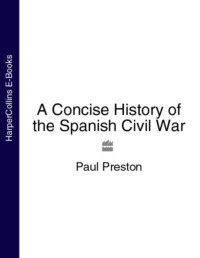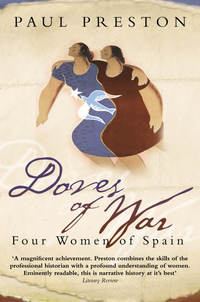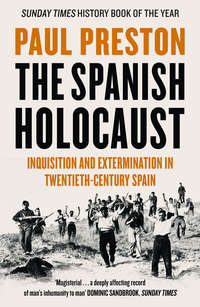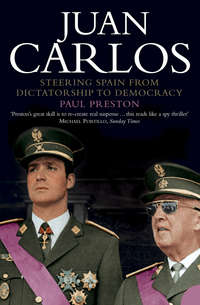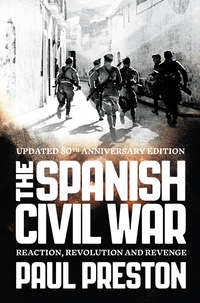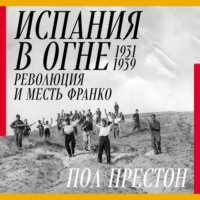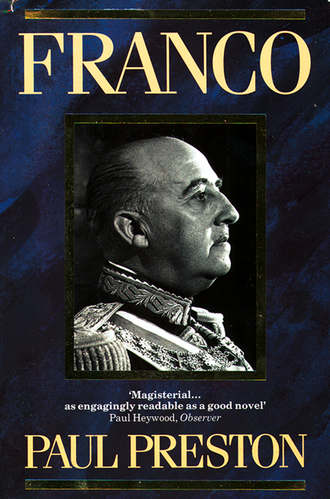
Полная версия
Franco
By a curious coincidence, just as Franco was dealing with the threat to his authority posed by the Carlists, another hazard placed itself uninvited on his agenda. Don Juan de Borbón, the heir to the throne of Alfonso XIII, remained anxious to take part in the Nationalist war effort. He wrote to the Generalísimo on 7 December 1936, reminded him that he had served in the Royal Navy on HMS Enterprise and HMS Iron Duke and respectfully requested permission to join the crew of the battlecruiser Baleares which was then nearing completion. Although the young prince promised to remain inconspicuous, not go ashore at any Spanish port and to abstain from any political contacts, Franco was quick to perceive the dangers both immediate and distant.58 If Don Juan were to fight on the Nationalist side, intentionally or otherwise, he would soon become a figurehead for the large numbers of Alfonsine monarchists, especially in the Army, who, for the moment, were content to leave Franco in charge while waiting for victory and an eventual restoration. There was the danger that the Alfonsists would become a distinct group alongside the Falangists and the Carlists, adding their voice to the political diversity which was beginning to come to the surface in the Nationalist zone. Having just been liberated from the problem of José Antonio Primo de Rivera and in the process of cutting down Fal Conde, Franco was hardly likely to welcome Don Juan de Borbón with open arms.
His response was a masterpiece of duplicity. He delayed some weeks before replying to Don Juan. ‘It would have given me great pleasure to accede to your request, so Spanish and so legitimate, to fight in our navy for the cause of Spain. However, the need to keep you safe would not permit you to live as a simple officer since the enthusiasm of some and the officiousness of others would stand in the way of such noble intentions. Moreover, we have to take into account the fact that the place which you occupy in the dynastic order and the obligations which arise from that impose upon us all, and demand of you, the sacrifice of desires which are as patriotic as they are noble and deeply felt, in the interests of the Patria … It is not possible for me to follow the dictates of my soldier’s heart and to accept your offer.’59 Not only did he thus gracefully refuse a dangerous offer, and so dissipate the threat, but he also squeezed considerable political capital out of so doing. He let it be known ‘secretly’ among Falangists that he had prevented the heir to the throne from entering Spain because of his own commitment to the future Falangist revolution. He also gave publicity to what he had done and gave reasons which consolidated his own position among the monarchists. ‘My responsibilities are great and among them is the duty not to put his life in danger, since one day it may be precious to us … If one day a King returns to rule over the State, he will have to come as a peace-maker and should not be found among the victors.’60 The cynicism of such sentiments could only be appreciated after nearly four decades had elapsed during which Franco had dedicated his efforts to institutionalizing the division of Spain into victors and vanquished and omitting to restore the monarchy.
For the moment, however, Don Juan was a minor problem compared with the military task facing the Generalísimo. At the end of November, Varela had launched an operation to relieve the Nationalist troops tied down to the north-west of Madrid in the Casa de Campo and the Ciudad Universitaria. Little was achieved and the casualties were enormous on both sides. A further effort was made on 15 and 16 December, also at the cost of heavy losses.61 Both sides had dug in to regroup, and for more than three weeks, the Madrid front saw only partial, albeit bitterly contested, actions. The daring and decisiveness with which Franco had confronted the problems of crossing the Straits and the first precipitate dash northwards of the African columns were now consigned to the past.
General Faupel was shocked when Franco boasted to him in early December ‘I will take Madrid; then all of Spain, including Catalonia, will fall into my hands more or less without a fight’. Faupel regarded this as a frivolous assessment since Franco was now faced with a complex war of manoeuvre. The retired German general concluded that Franco’s ‘military training and experience do not fit him for the direction of operations on their present scale’. In fact, despite the bravado of his words, Franco faced the task with a plodding, indeed hesitant, prudence. He also accepted with deference the overbearing advice of Faupel who, despite Hitler’s admonition to keep out of military affairs, was profligate with his opinions. The Generalísimo, who regarded himself as the most meticulous officer in the Spanish army, exercised iron self-control and swallowed Faupel’s peremptory and patronizing instruction to issue ‘sharp orders for the better care of equipment, rifles and machines guns in particular.’ He was playing for higher stakes and on 9 December asked Faupel ‘that one German and one Italian division be placed at his disposal as soon as possible’.62
Subsequently the Caudillo claimed that he had requested German and Italian arms not troops.63 However, that became true only much later in 1937 after a massive conscription and recruiting operation. In December 1936, with his armies exhausted and decimated at Madrid, he was desperate for reinforcements.* The Generalísimo was immensely lucky that, within two weeks of the offensive against Madrid breaking down because of his own shortage of reliable troops, the Duce should have decided to send massive aid. On 9 December 1936, Franco received the formal offer of Italian help in the form of officers, NCOs, specialist tank crews, radio operators, artillerymen and engineers, to be incorporated into mixed brigades of Spanish and Italian troops. Rome offered uniforms, armaments and equipment for these brigades and asked Franco how many brigades could be organized. Franco was delighted and arrangements for the creation of two such mixed brigades were made in mid-December. The necessary regular Italian army officers, specialists and ordinary ground troops would begin to arrive in mid-January.64
In the meanwhile, Hitler held a conference in the German Chancellery on 21 December with Göring, von Blomberg, Faupel, Warlimont, Friedrich Hossbach, the Wehrmacht liaison officer to the Führer and Werner von Fritsch, the Commander-in-Chief of the German Army. They discussed further assistance to Franco. Faupel asked for three divisions to be sent to Spain but was vehemently opposed by the others for fear of prematurely risking a general war. The Führer therefore decided not to send large numbers of German troops because his wider diplomatic game would derive more benefit from a prolongation of the Spanish Civil War than from a quick victory for Franco. It had been thought in Berlin since late November that the longer the war went on, the more likely Italy was to be drawn into the German orbit. Nevertheless, it was decided that Germany would send sufficient help in the form of aircraft, arms and equipment to ensure that Franco was not defeated.65 The Generalísimo was thus immensely fortunate to be able to count on support from Hitler and Mussolini which would be greater and more consistent than anything that the Republic could hope for from the Soviet Union.
In addition to the specialist regular troops necessary for the creation of the mixed Spanish-Italian brigades, Mussolini decided ‘in view of the unsatisfactory situation’ to send, two contingents of three thousand Black Shirts each, in self-contained units with their own officers, artillery and transport. On 14 December Roatta’s assistant, Lieutenant-Colonel Emilio Faldella, gave Franco a note to the effect that the Italian government wished the volunteers to be organized in autonomous Italian companies with Italian officers. It was made clear that these contingents would be additional to the proposed mixed brigades.66 Franco wanted troops but not in autonomous units under Italian command. His annoyance was revealed when he asked Faldella ‘Who requested them?’ and snapped ‘When one sends troops to a friendly country, one at least asks permission’.67
It is clear that Franco was glad to have the Black Shirts but had hoped simply to incorporate them into his own units as foreign legionaries. His suspicions of the efficacy of Falangist militias were not replicated with regard to the Italian Fascist volunteers since he had been told that they had been battle-hardened in Abyssinia. He was, of course, deeply irritated by the lack of consideration of his position implicit in the blunt and unexpected terms in which their arrival was announced. The strength of the Italian contingents that arrived in late December and early January was, according to a report by Faupel, based presumably on information from Roatta, ‘determined not by previous agreement with Franco but according to independent Italian estimates’.68 Nevertheless, he hastened to use them as soon as they disembarked and, on 12 January, he would request another nine thousand Black Shirts.69
Such external assistance was necessary to enable Franco to go forward from the deadlock in Madrid. On 28 November, General Saliquet had written to the Generalísimo with a proposal for an encircling operation, against the Madrid-La Coruña road to the north-west and a dual thrust from the south-west of Madrid and from Soria in the north-east towards Alcalá de Henares.70 Franco mused over this proposal for three weeks and it was not until 19 December that he issued orders which would break the stalemate prevailing since he had called off the frontal assault on Madrid at the Leganés meeting on 23 November. They envisaged a refinement of Saliquet’s plan, implementing it closer to Madrid by three thrusts outwards from the exposed wedge which the Nationalists had driven into the capital’s defences.71
In heavy rain and fog, across muddy terrain, costly and sterile battles were fought for villages like Boadilla del Monte which was virtually destroyed. Varela was wounded on Christmas Day and field command was assumed by Orgaz. After crippling losses in the fighting, the attack was briefly called off. Roatta telegrammed the Ufficio Spagna on 27 December complaining of apathy at Franco’s headquarters and reporting that the Generalísimo’s staff was incapable of mounting an operation appropriate to a large-scale war.72 On 3 January, the assault was renewed with increased ferocity and reached the important crossroads at Las Rozas on the road to El Escorial and La Coruña. On 7 January, Pozuelo and Húmera fell. In six days, scarcely ten kilometres of road had been taken by the Nationalists. They had eased the pressure on their troops in the Casa de Campo and the Ciudad Universitaria but at enormous cost. When the fronts had stabilized by 15 January, each side had lost in the region of fifteen thousand men.73 The various efforts to take Madrid had severely depleted Franco’s forces. The Republicans were now solidly dug in and Franco was fortunate that they were unable to seize the unique opportunity to launch a counter-attack to break through his severely overstretched lines.
In the midst of the reverses around Madrid, Franco was relieved to discover that his cultivation of the Church was bearing fruit. On 22 December, Cardinal Gomá returned from Rome where he had been frantically working for Vatican recognition of Franco. The cautious Curia held back but, in order to demonstrate the Church’s sympathy for Franco’s cause, Gomá was appointed the Vatican’s confidential Chargé d’Affaires in Nationalist Spain. It was the crucial first step towards full diplomatic recognition.74 Gomá and the Generalísimo met on 29 December and agreed on a joint statement to the Vatican, in which it was made clear that, in the interests of eventual recognition, Franco was ready to do everything possible to favour the Church’s position in Spain.75
The clinching of relations with the Vatican was of immense long-term political importance to Franco. In immediate terms, even more welcome was the military help promised by Mussolini. With the attacks around Madrid stalling, Franco had been relieved by the fact that in mid-December, the Duce had begun sending the first of what, by mid-February 1937, would be nearly fifty thousand fascist militiamen and regular troops masquerading as volunteers.76 Whatever gloss Franco would put on it later, the arrival of Italian reinforcements was of crucial importance to his military survival. Inevitably, once the Duce had committed his own prestige to a Nationalist victory in Spain, the stalemate around Madrid quickly intensified his impatience with Franco. At the end of the year, he requested Hitler to send to a meeting in Rome in mid-January someone ‘with full powers’ to discuss Italo-German co-operation to bring about ‘a real decision in Spain’.77 In fact, it was becoming ever more apparent that the Italians were going to be left by Hitler to make the decisive contribution to Franco’s success. Roatta reported to Rome on 12 January that Canaris had told him that Sperrle was pessimistic about both the initial efficacy of the Condor Legion and the state of the Nationalist forces. Sperrle, in turn, told Roatta that the real problem was German fear of provoking a premature war with France.78
At the meeting held at the Palazzo Venezia on the evening of 14 January 1937, Hitler’s representative was Hermann Göring.* Mussolini was irritated that Italo-German aid, rather than spurring Franco on to greater efforts, merely permitted him to indulge his natural inclination to wear down the Republic by a slow campaign of attrition. Göring agreed that, if Franco had known how to use it properly, the Italo-German material and technical assistance was enough to have permitted him to win already. The Air Minister declared bitterly that the recognition of Franco before the capture of Madrid had been a major error to remedy which it was agreed that he would have to be subjected to ‘energetic pressure’ to accelerate his operations and make full use of the lavish means put at his disposal.
Despite his expressions of solidarity with Mussolini, fear of international complications impelled Göring to say that Germany could not send a division to Spain. This left the immediate task of preventing Franco being defeated to the Duce who was disappointed but not unhappy to be the senior partner in Spain. Declaring that Franco must win, he said that there were no longer any restraints on his actions in Spain. To ensure that Franco adopt a more energetic policy, it was decided to oblige him to accept the joint Italo-German general staff. Mussolini and Göring agreed that to ensure Franco’s victory before, as they wrongly imagined would happen, the British erected an effective blockade to stop foreign intervention,* substantial additional aid would have to be sent to Spain by the end of January. Mussolini suggested telling Franco that thereafter there would be no more help.79
On the day after the meeting in the Palazzo Venezia, the chiefs of staff of the Italian military ministries met at the Palazzo Chigi with the staff of the Ufficio Spagna and Ciano’s representative Anfuso to discuss the minimum programme of aid to Franco. Partly out of contempt for Franco’s generalship and partly out of a desire to monopolize the anticipated triumph for Fascism, it was agreed that the Italian contingent must be used as an independent force under an Italian general only nominally responsible to Franco’s overall command. Three possibilities were outlined for the decisive action by which Italian forces would win the war for Franco. Mussolini favoured a massive assault from Teruel to Valencia to cut off Catalonia from the rest of Spain. This was to be preceded by the terror bombing of Valencia. However, it was acknowledged that such an operation required the full co-operation of Franco. A second option was a march from Sigüenza to Guadalajara to tighten irrevocably the Nationalist grip on Madrid. The third more limited possibility was the capture of Málaga to provide a seaport nearer to Italy and a launching pad for an attack on Valencia from the south-west.80
After his failures around Madrid, Franco had little choice but to grit his teeth and acquiesce in the demeaning Italo-German suggestions which were communicated to him by Anfuso on 23 January. The document presented by Anfuso made it clear that international circumstances prevented aid being continued indefinitely.81 At first, the Generalísimo seemed perplexed.82 However, on the following day, he gave Anfuso a note expressing his thanks for Italo-German help and a desperate plea for it to continue for at least another three months.83 The prospect of the British imposing an effective blockade galvanized him into giving serious consideration to the three strategic proposals made by the Italians. In effusively thanking Mussolini for his assistance, Franco told Anfuso that he would now accelerate the end of the war by undertaking a great decisive action. On 26 January, he accepted Roatta’s suggestion that, henceforth, the regular high-level advice of Faupel and Roatta on major strategic issues would be implemented by Franco’s own staff, in which were to be included ten senior German and Italian officers.84 Mussolini considered that he could send instructions to Franco as to a subordinate.85
Sensitive to any slur or slight, Franco cannot fail to have resented the clear insinuation of German and Italian disdain for his military prowess. Nevertheless, he showed no sign of it and accepted, along with the imposition of foreign staff officers, Mussolini’s strategic suggestions. According to Kindelán, anxious to play down Franco’s deference to the Duce, the Generalísimo was unsure of the military value of the new arrivals, despite the fact that they were well-equipped by comparison with his own troops and many had had experience in the Abyssinian war. He thus decided to test them in a relatively easy campaign in the south.86
It is indeed the case that, to offset the failure in Madrid, the Generalísimo had already accepted a proposal from Queipo for a piecemeal advance towards Málaga. A sporadic campaign to mop up the rest of Andalusia, as savage and bloodthirsty as the march on Madrid, had been intensified in mid-December with considerable success.87 However, after the arrival of Italian troops, the nature of the campaign changed dramatically. Rather than Franco skilfully blooding them in a campaign of his choice, they were engaged in an operation chosen by Mussolini. As the Black Shirts were setting out, Mussolini had reminded Roatta on 18 December 1936 of his own long-held conviction that a major attack should be launched against Málaga. Roatta immediately informed Franco of the Duce’s preference and found him grudgingly amenable (sufficientemente propenso) to it. Thereafter, the Duce followed the progress of the attack with an enthusiasm commensurate with it having been his own brainchild.88
Franco wanted to incorporate the newly arrived Italians into mixed units on the Madrid front but had to acquiesce in Mussolini’s desire to see them operate autonomously in Andalusia.89 In the light of the thin and scattered defences of Málaga, Roatta wanted a guerra celere (rapid strike) attack by his own motorised columns whereas Franco favoured Queipo’s original proposal for a gradual but thorough conquest of Republican territory. Franco was not much interested in a lightning victory for which Mussolini could take the credit and which might end the war before his leadership was consolidated. On 27 December, Roatta effectively overruled the Generalísimo’s preference for a slow advance backed up by political purges. They reached a compromise in which both types of assault would take place simultaneously. Franco had to bite his tongue when his request for two Italian motorised companies for the Madrid front was rejected by Roatta on the grounds of his own greater needs in preparing the attack on Málaga. On 9 January 1937, an optimistic Roatta and a sceptical Queipo agreed a division of responsibilities which reflected Franco’s concessions.90 Under the direction of Queipo de Llano who was installed on the battlecruiser Canarias, and of Roatta on land, two columns began to advance in mid-January. By the end of the month after the capture of Alhama on the Málaga-Granada road, they were ready for the final push.
Colonel Wolfram von Richthofen, Chief of Staff of the Condor Legion, wrote in his diary on 3 February ‘nothing is known about the Italians, their whereabouts and their intentions. Franco knows nothing either. He really ought to go to Seville to put himself in the picture and hope for a share of the Málaga victory laurels.’91 To make good his ignorance and to give the impression of overall control of events, Franco was already travelling from Salamanca to Seville on 3 February, the same day on which, in torrential rain, the Italo-Spanish forces moved on Málaga. The advance took the form of troops distributed in a large concentric circle, the Spanish units moving eastwards from Marbella and the Italian motorized columns racing south west from Alhama without concern for their flanks.92 The Generalísimo visited the front and on 5 February at Antequera discussed the progress of the campaign with Queipo and Roatta. Convinced that the operation was going to be succesful, he did not wait for the fall of Málaga but returned to Seville on 6 February and to Salamanca on the following day to oversee a new push on the Madrid front.93
On 7 February, after a rapid march, Nationalists and Italians reached Málaga. Its military command had been changed with alarming frequency in the preceding days, morale was abysmally low, and after bombing raids by Italian aircraft and bombardment by Nationalist warships, the city collapsed easily. Italian troops were first to enter Málaga and briefly ruled the city before ostentatiously handing it over to the Spaniards. Roatta claimed the victory for Mussolini and sent a triumphant, and implicitly wounding, telegram to Franco: ‘Troops under my command have the honour to hand over the city of Málaga to Your Excellency’.94 In fact, given the massive numerical and logistical superiority of the attackers, the triumph was less of an achievement than it seemed at the time. Neglected by the Valencia government, the defending forces were in more or less the same state of readiness as the improvised militiamen who had faced Franco’s Army of Africa six months earlier.95 Neither the Nationalists nor the Italians showed much mercy. The international outcry was less than that provoked by the massacre of Badajoz, because Franco had ordered all war correspondents to be kept out of Málaga.96 After the battle, Queipo and Roatta sent a motorised column to pursue refugees escaping along the coast road. Within the city itself nearly four thousand Republicans were shot in the first week alone and the killings continued on a large scale for months. The refugees who blocked the road out of Málaga were shelled from the sea and bombed and machine-gunned from the air.97
When Roatta’s news of the victory at Málaga reached Salamanca, Franco unsurprisingly showed little interest. His humiliating subordination to Mussolini had been starkly underlined. Millán Astray, who came to congratulate the Generalísimo and found him absorbed gazing at a huge wall map, exclaimed: ‘I expected to find you celebrating the victory in Málaga not here on your own looking at a map.’ Franco diminished the Italian achievement by pointing at the map and saying ‘Just look what remains to be conquered! I can’t afford the luxury of taking time off.’98 This gloomy and contrived effect of unceasing military dedication was out of tune with Franco’s normally irrepressible faith in victory. He was certainly preoccupied by the progress of the battle in the Jarama valley which he had launched just as Málaga was about to fall but he could hardly have been immune to the fact that the loss of Málaga was a fierce blow to the Republic in terms of captured territory, prisoners and weaponry. He had gained the food-producing province of Málaga and most of Granada, deprived his enemies of a strategically crucial sea port with a population of one hundred and fifty thousand people and shortened the southern front. The feigned lack of interest revealed his resentment of the disdainful Roatta and the fact that he could take no pleasure in a triumph attributed by the world’s press to Mussolini.99


